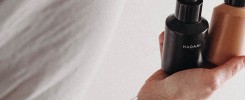There is so many misleading information and sometimes just getting frustrating to examinate all facts.
We are here for:
![]()
#1 Facial massage improves skin health in the long term.
While facial massage may offer short-term benefits such as improved circulation, reduced puffiness, and a temporary glow, there is no strong scientific evidence that it improves skin health or slows aging in the long term.The visible effects are often due to increased blood flow and fluid drainage, which subside shortly after the massage ends.
In fact, repeated or improper massage techniques—especially those involving stretching, pulling, or excessive pressure—may strain the skin’s support structures over time. Elastin fibers, which give skin its bounce and resilience, can weaken when subjected to chronic mechanical stress. This is why gentle handling of the skin is generally recommended to preserve firmness and elasticity.
#2 Tingling or cooling sensation means a product is working.
Not necessarily. A tingling or cooling sensation is often a sign that your skin is being stimulated — but that doesn’t always mean it’s a good thing. In many cases, tingling is a mild form of irritation, which can trigger inflammation and compromise the skin barrier over time, especially with repeated use.
Some ingredients, like menthol, alcohol, or certain acids, can create a cooling or tingling effect, but this sensation is not an indicator of effectiveness. In fact, consistent tingling may reflect that the product is too harsh or unsuitable for your skin type. Long-term irritation can accelerate the breakdown of collagen and elastin, contributing to premature aging.
Bottom line: A product doesn’t need to tingle or sting to be effective — in fact, the best formulations for skin health tend to work quietly and gently.
#3 Dry skin?Just drink more water!
Not quite. While staying hydrated is important for overall health, simply drinking more water doesn’t directly translate to more hydrated skin — especially if your skin barrier is compromised.
Dry skin is typically caused by a lack of lipids and natural moisturizing factors in the outermost layer of the skin, not a shortage of internal water. Environmental factors (like cold air, wind, or dry indoor heat), harsh cleansers, and over-exfoliation can all strip the skin’s barrier and lead to dryness, flakiness, and irritation.
The real solution? A good skincare routine focused on repairing and protecting the skin barrier — using ingredients like ceramides, glycerin, hyaluronic acid, and occlusives — is what truly helps combat dry skin.
#4 Drying up skin with astringents and strong cleansers can get rid of acne.
False. Acne is a chronic inflammatory skin condition, and harsh treatments that strip or irritate the skin often make it worse, not better.
Using products with drying alcohols, strong astringents, or abrasive scrubs can damage the skin barrier, trigger more inflammation, and increase oil production as your skin tries to compensate. This leads to more breakouts, prolonged healing time, and worsened redness and swelling.
Effective acne treatment focuses on reducing inflammation, gently regulating oil production, and supporting skin barrier repair — with ingredients like salicylic acid, benzoyl peroxide (in appropriate concentrations), niacinamide, and retinoids.

#5 Skin repairs itself best at night.
Not entirely true. While it’s commonly believed that the skin’s repair processes peak during sleep, recent research shows that skin may actually heal more efficiently during the day — especially when you’re active.
Daytime movement boosts circulation and oxygen delivery, which enhances tissue repair and cell regeneration. In contrast, while some hormonal and cellular repair activity does occur at night (like increased melatonin and growth hormone levels), the reduced blood flow and oxygenation during sleep can limit healing capacity.
The truth? Skin repair happens around the clock, but being physically active and having healthy daytime circulation plays a much bigger role in wound healing than previously thought.
#6 Natural ingredients are better for skin.
Not always. While many natural ingredients — like aloe vera, green tea, and oat extract — offer proven benefits for the skin, “natural” doesn’t automatically mean safe or effective.
Plenty of natural substances, such as essential oils, citrus extracts, or witch hazel, can be harsh, sensitizing, or even damaging, especially for sensitive or compromised skin. On the flip side, many lab-created (synthetic) ingredients are developed to be stable, effective, and less irritating, often outperforming their natural counterparts.
The key is evidence-based formulation, not whether an ingredient is natural or synthetic. What truly matters is how the ingredient works with your skin.
#7 Do DIYs really work?
Not really. While it might seem natural and harmless, most DIY skincare using ingredients like lemon, apple cider vinegar, honey, or yogurt can actually harm your skin.
These household items are not formulated for use on the skin — they often have unstable pH levels, potential allergens, and irritating compounds that can disrupt your skin barrier, cause inflammation, or even lead to burns (as in the case of lemon juice and vinegar under sun exposure).
While some ingredients like non-fragrant plant oils (e.g., olive or sunflower oil) can help with dryness, the rest of your kitchen belongs on your plate, not your face. Effective skincare relies on research-backed formulations that balance safety, potency, and stability — something DIY mixtures can’t guarantee.
#8 Essential oils are great for treating skin concerns.
Not necessarily. While some compounds in essential oils have antibacterial or antioxidant properties, the volatile fragrance components they contain can be irritating — especially to sensitive or compromised skin.
Essential oils like lavender, citrus, peppermint, and tea tree are commonly promoted for skin benefits, but they also contain sensitizing ingredients that can cause redness, stinging, inflammation, or allergic reactions over time — even if they seem fine at first.
In contrast, non-fragrant plant oils such as jojoba, sunflower, argan, or rosehip oil are rich in beneficial fatty acids and antioxidants — and they nourish the skin without triggering irritation.
Bottom line: Essential oils may smell nice, but they’re often not so nice for your skin — especially when there are gentler, more effective options available.
#9 Sheet masks are beneficial for skin.
Not really. While sheet masks can feel pampering and offer a temporary hydration boost, there’s no scientific evidence that they provide long-term skin benefits or outperform well-formulated skincare products.
The effectiveness of any skincare product — including sheet masks — depends on the ingredient formulation, molecular size, and the delivery system, not on how long the mask sits on your face.
In fact, good skincare routines are thoughtfully designed so that some ingredients stay on the surface to protect the skin barrier, while others penetrate deeper to hydrate, nourish, or trigger repair processes. A sheet mask can’t replace that kind of targeted, layered approach.
Bottom line: Sheet masks are fun and relaxing, but they’re not a skincare essential — a high-quality serum or moisturizer will give you far more lasting results.
#10 Ethnicity based based beauty brands?
Not quite. Ethnicity, race, gender, or age are not skin types. Your skin’s needs are determined by its condition — like oiliness, dryness, sensitivity, or the presence of concerns like acne, hyperpigmentation, or rosacea — not by your cultural background or where you’re from.
While there can be some genetic differences (such as melanin levels, skin thickness, or propensity for certain conditions), the core science behind treating skin concerns is the same across all groups. Ingredients that target acne, wrinkles, or uneven tone work based on how the skin functions — not your ethnicity.
Brands that focus on specific communities often do so to address representation and cultural relevance, not because the skin itself requires radically different treatments.
Bottom line: Great skincare is about what’s happening on your skin, not where you come from.
#11 You should change your skincare routine because your skin is adapting to your skincare.
False. Skin doesn’t “adapt” or become resistant to beneficial skincare ingredients — any more than your body stops benefiting from eating fruits and vegetables over time.
If a product contains ingredients that are proven to support skin health — like antioxidants, ceramides, retinoids, or peptides — they will continue to deliver those benefits as long as they’re used consistently and correctly. What can change is your skin’s needs due to age, climate, hormones, or health — not because it’s “bored” of your routine.
Bottom line: If your skincare is working, there’s no need to change it. Skin doesn’t build tolerance to goodness — it thrives on consistency.

